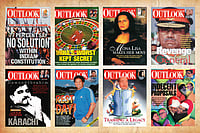Indeed, Booze Business is Big Business in Gujarat today. The figures are revealing. Government estimates of whiskey sold in Gujarat from April to December last year: 15,000 cases. IMFL manufacturers' estimates for the same period: 2.4 million cases. International Distillers and Vintners India (IDI) top shots state off the record that 75 per cent of the 4.6 million cases of whiskey purportedly sold in Rajasthan finds its way into Gujarat. Not to mention the quantities that leak in from neighbouring Maharashtra and Daman. Why Rajasthan as a favoured conduit for liquor supplies into Gujarat? "The answer lies in the peculiar excise structure that prevails in Rajasthan," reveals an IDI source. "Licences are auctioned. Dealer cartels bid for the licence, a high licence fee that bears no correlation to actual sales volumes is payable. It's the buffet lunch principle: buy the goods, then use or sell as you please. Rajasthan dealers buy legally, sell illegally. They sell their stocks in Gujarat."
The sale is made for a low Rs 30 per whiskey bottle to Gujarati wholesalers after some clever diluting of the Bacchus brew, often with chemical substitutes. Maruti vans sneak into Gujarat via Mount Abu in Rajasthan. "A vanload worth Rs 1.5 lakh sells for Rs 4.5 lakh here," reveals a wholesaler, "which is why the Rs 3,000 to Rs 4,000 bribe per van to the octroi people doesn't hurt." Wholesalers sell the whiskey for Rs 70 to retailers who in turn sell customers a bottle of Bagpiper, Aristocrat, Officers' Choice, Director's Special, Democrat or Darling Whiskey for Rs 100 to Rs 120. "Rs 100 for home delivery, Rs 120 for 'open market sale' because the risk quotient on the road is higher," reveals Rancchodbhai. Home deliveries are effected by buzzing bootleggers on their pagers! "We call them Pager Pegwalas," says a bemused customer.
The average bootlegger sells 100 bottles a day. Compute profits at Rs 20 per bottle and you arrive at a monthly income of Rs 60,000 for the bootlegger. Only half of which he manages to pocket. The other half goes towards gambling with the boys, complimentaries, as "friendship expenses for the police" reveals another bootlegger Rameshbhai. Arrests are treated as occupational hazards. Rameshbhai is blase. "Jail today, bail tomorrow. Every business has a risk factor. In 10 years I got arrested twice, paid Rs 30,000 in legal expenses. That's less than what I'd pay as tax if I had a regular job." The police are viewed as friends rather than foes. "They are our partners bhai," laughs Surudh Shah, a veteran wholesaler.
It's a lucrative partnership. Payoffs to SHOs in premier Ahmedabad localities like Navrangpura, Narayanpura and Vatwa are rumoured to be as high as Rs 3 lakh per month. Beat constables apparently collect the money from wholesalers. A sum of Rs 50,000 goes to the SHO, the rest finds its way into the pockets of minions in the offices of the local prohibition authority, the police commissioner and the crime cell. It is reckoned, monthly tributes of Rs 3 lakh are paid to at least 10 major police stations. Which works out to kickback money to the tune of Rs 30 lakh a month. If kickbacks constitute even 10 per cent of the actual volume of business transacted, it would be logical to presume that the booze bazaar is booming in Gujarat. "It's a Rs 30 crore per year market," assert industry sources.
A market governed by its own peculiar logic. "Bona fide booze sells for double the price because its not diluted, but my customers are so used to buying spurious whiskey from me at Rs 120 a bottle, they'd call me a cheat if I sold them the genuine stuff. Honesty is bad business," says another veteran bootlegger, Bipinbhai Shah who buys liquor for personal consumption from the government wine shop because "it's safer". In the prevailing scenario, the person left feeling most unsafe is clearly the common citizen of Gujarat. Government shops continue to sell liquor at punitive prices (Rs 190 for a half bottle of Royal Velvet whiskey, Rs 37 for a bottle of Vazir beer), prohibition authorities continue to harangue permit seekers, humiliate them with forms demanding to know "name of drunkard" and "reason for which the drunkard drinks", persist in treating oenophiles as juveniles. Thereby driving them into the arms of dealers hawking spurious liquor. More liquor tragedies will occur, more people might die. But how does it matter? A moral brownie point would have been scored.


























